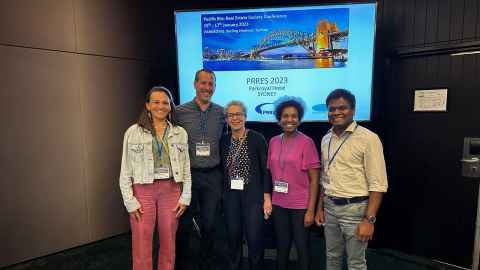Student success and a top turnout at PRRES 2023
Student success coupled with excellent representation at the annual PRRES Conference made a great start to the year for the Department of Property.

Held in Sydney from 15-17 January, this year’s Pacific Rim Real Estate Society (PRRES) Conference was notable as the first PRRES conference to be held in person since the onset of the Covid-19 pandemic. “It was so good to reconnect with all the researchers,” says Associate Professor of Property Olga Filippova. “Although it’s easy to collaborate online these days, having an opportunity to meet in person is important.” The Department of Property was particularly well-represented at this year’s event, she notes, with four PhD students (Qing Tong, Nicole Xiang, Muzzammil Zekri, and Yihan (Gary) Guan) and another three staff members (Abdul-Rasheed Amidu, Michael Rehm, and Professor Deborah Levy) attending with her. “We were probably one of the strongest teams at the conference,” observes Olga. “This is our regional conference, and we always try to have some representation there, but we really showed in good numbers this year.”
The aim of the conference is to nurture and advance understanding and cooperation in the changing environment of property education and industry. Research is a strong focus: the conference hosts a number of Australian and international speakers at the forefront of research and policy-making, and also provides a PhD Colloquium, a full-day programme for PhD students with presentations covering property valuation, property taxation, real estate development, property investment, listed property companies, and REITs.
Student success
To the delight of the Auckland delegation, it was at this PhD Colloquium that PhD student Yihan (Gary) Guan was awarded the PRRES PhD Commendable Prize – First-Year Student for a presentation on his PhD research proposal and the progress of the research. Gary’s research focuses on the commercial property field: he aims to study the factors of retail gravitation and their relationship with retail property value, providing insights for retail property investors to improve their resilience during unforecastable contingencies and events such as the pandemic. Gary believes that the practical nature of his research and the “novelty” of his measuring methods – “[my] methods of measuring two critical variables – foot traffic and accessibility – are distinct from traditional measurements” – could have been factors that impressed the judges.
It was the first PRRES conference Gary had attended. He cites the encouragement of his supervisor, Dr William Cheung, as a key factor in his decision to participate: “He helped me a lot with the progress of my research and encouraged me to present my research at the PRRES Conference, which provided me with the confidence to attend.”
Gary’s initial goal in attending was simply to present his research to industry experts for their feedback; however, the conference well exceeded his expectations. “As I started interacting with different experts and peers, their openness and willingness to listen not only created a comfortable atmosphere for me, but also encouraged the exchange of thoughts and insights,” he explains. “As time went on, I became increasingly captivated by the abundance of knowledge being shared and the diverse viewpoints that were presented. Alongside gaining perspectives within my area of research, connecting with professionals and scholars from different backgrounds was incredibly beneficial to me.”
Making and renewing connections
Along with the success of current students like Gary, a highlight of the conference was the chance for Property staff to reconnect with former PhD students. One of these was Dr Dulani Halvitigala, who was the Property Department’s first PhD student – and, in fact, its only PhD student when Olga joined the teaching staff in 2005: “The whole department was looking after her,” remembers Olga. “She was really part of the family.” Dulani is now an academic teaching at RMIT University in Australia; the other former PhD students have also become academics who are teaching at various institutions in Australia. “It was a highlight for me to see our early students and to see their success, alongside our new generation of PhD students,” says Olga.
As well as affording valuable opportunities to “grow our research network, reconnect with people and also make new connections”, the conference therefore highlighted for Olga how much the Department of Property has grown over the years. “We started out with one PhD student, and now our programme has grown, and we have at least 10 to 12 students at any given time in the department,” she observes. “We are now attracting a lot more talent.” With both past and current success clearly on display on the international stage, the future for the Department of Property certainly looks bright.